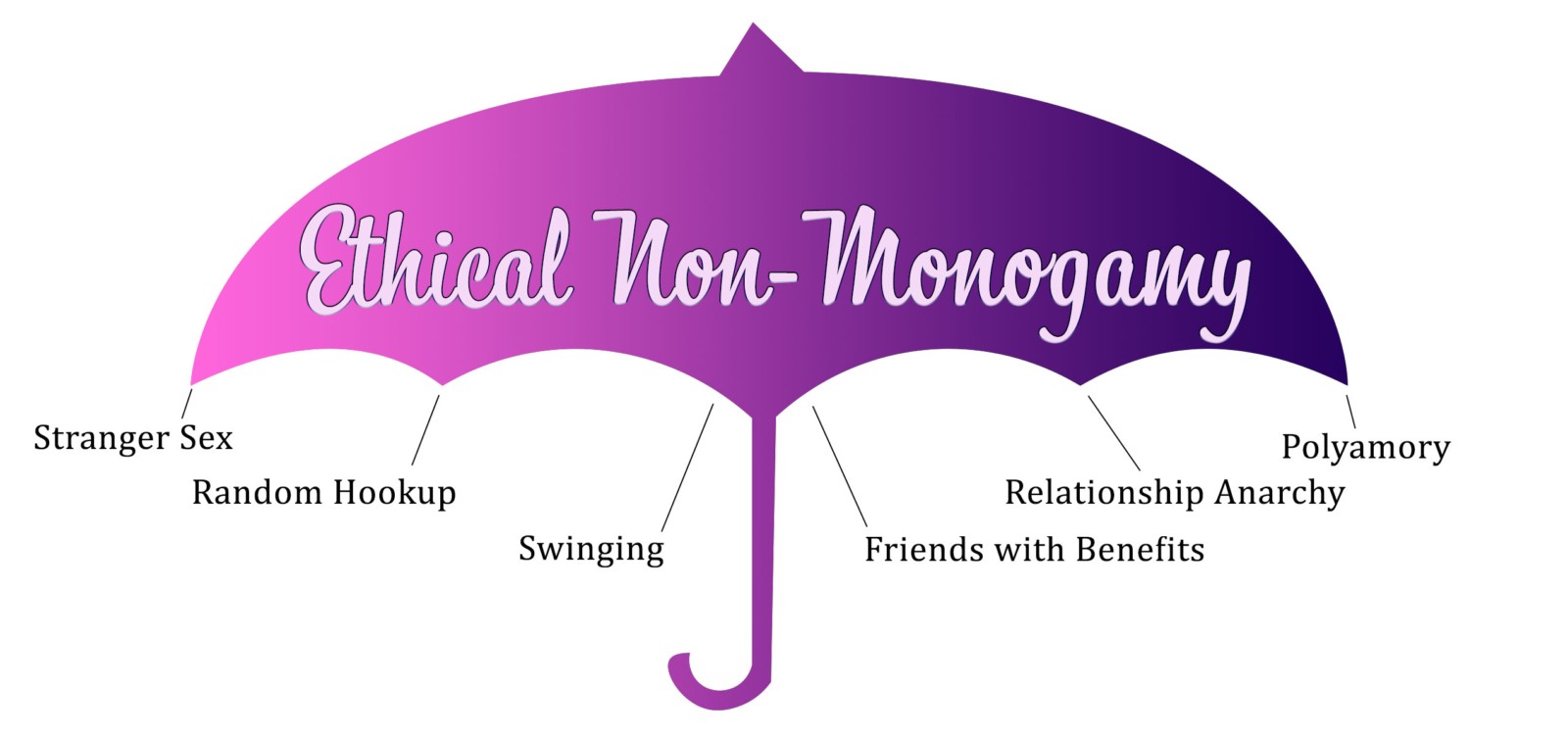Nonmonogamy is the practice of having more than one sexual and/or romantic partner. There are many different forms of nonmonogamous relationships that involve different agreements between partners about what they can and cannot do. This blog post will explore Ethical non-monogamy, which focuses on the mental, emotional, and physical health of all parties involved in a relationship.
Contents
What Is Ethical Non-Monogamy?
 Ethical Non-monogamy is a term used to describe a relationship style in which all parties involved agree to have multiple sexual and/or romantic partners, with the consent of everyone involved. This is not cheating, as all parties are aware of and approve of each other outside relationships.
Ethical Non-monogamy is a term used to describe a relationship style in which all parties involved agree to have multiple sexual and/or romantic partners, with the consent of everyone involved. This is not cheating, as all parties are aware of and approve of each other outside relationships.
This also means that you need to be able to handle your partner having sex with someone else.
Is Ethical Non-Monogamy For You?
Ethical non-monogamy is for anyone who wants an open relationship and has the communication skills needed in order to make it work. This means that all parties have a say in what goes on within their relationships, including setting rules and boundaries. If you’re not willing to set any ground rules or don’t feel comfortable voicing your opinion then this might not be for you just yet! Just because some people are monogamous doesn’t mean they’re wrong – if this isn’t right for you but more power too ya – do you.
Types of Ethical Non-Monogamy

There are many types of ethical non-monogamy, but the three most common are:
Open Marriage
This is a marriage where one or both spouses have sexual encounters outside of the relationship with their spouse’s knowledge and consent. This is not cheating, since both partners are aware of the arrangement and it’s often discussed as part of the marriage.
Polyamory
A form of ethical non-monogamy that involves more than two people in a romantic relationship together, where everyone involved knows about everyone else, approves of their involvement with each other, and all the primary/secondary terms are explicitly discussed in a relationship-type contract.
Casual Sex
This is what most people think of when they hear the term “swinging”. Casual sex usually involves a couple going to a swingers’ club, picking up another couple or a single person for a sexual encounter that everyone consents to and will have no ongoing relationship with.
Rules of Ethical Non-Monogamy
There are some rules of thumb that are good to have when engaging in any non-monogamous or polyamorous relationship. These rules are commonly referred to as ‘rules of ethical non-monogamy’.
These are some of it:
1) Communicate with your partner(s) about what you like, what you want to do, and what your boundaries are with regard to sex.
2) Communicate everything. If you don’t communicate then it is impossible for your partner(s) to know what they can expect from the relationship.
3) Be open about things that would make people not inclined to be non-monogamous or polyamorous feel comfortable (i.e. communicating about sexual preferences). Being non-monogamous does not mean being permissive of abusive behavior in any form.
4) Never do something because someone else wants you to or expects you to unless it is completely okay with all parties involved and everyone knows about it. 5) Make sure your partner is before you are happy. It is not okay to try and push your partner into being non-monogamous or polyamorous. Being non-monogamous is about compromise, not coercion.
6) Remember that everyone’s boundaries are different. Do not expect anything from anyone else during sex, including orgasm. If someone wants you to do something but you are uncomfortable with it, ask them to stop the moment they cross a line. If they keep going then end the relationship immediately because they have proven themselves incapable of respecting boundaries regardless of consent. Consent must be given freely without pressure, regardless of previous sexual activity between partners.
7) Don’t let people use you as an excuse to justify their behavior. Something doesn’t become okay just because someone who has hurt you before has done it.
8) Keep in mind that not everyone makes good decisions about how to handle their relationships. Some people are selfish, some are too submissive or subservient, others are overly dominant or controlling. Sometimes people just don’t know what they want. All of these things can lead to mistakes being made. Not everyone is perfect and no one is responsible for the mistakes another person makes. However, if someone constantly mistreats you then you have every right to “walk away” from them – even if that means ending the relationship entirely.
9) Don’t be afraid of repercussions. If it’s consensual, there shouldn’t be any consequences other than those both parties agree on together.
10) Don’t be a hypocrite. If you have rules about what your partner can do in their time apart from you, then they have every right to have ruled the same for you. This includes monogamous people, by the way. Monogamists need to learn that they aren’t entitled to cheat just because they’re in a relationship and think it’s okay since monogamy is about exclusivity. If someone supported infidelity when they were single then why would things change just because they are in a relationship now?
11) Acknowledge that sexual problems or mistakes don’t always mean that either person is bad, but may simply indicate incompatibility. People make mistakes despite their best intentions all the time, which is exactly why communication is so important.
12) Make sure your friendship comes before sex. Without honesty and trust that is based on time spent together outside of any romantic or sexual context, all that remains is a form of prostitution by deception.
13) Don’t let anyone pressure you into doing something you don’t want to do just because they want to do it. Sometimes people can be selfish and demanding. You don’t need to please everyone and you shouldn’t feel like you have to make someone else happy at the expense of your own happiness. This is not how relationships work. Your partner isn’t entitled to having sex with you against your will, yet some people still try this anyway; sometimes even if their partners said no (see point #8).
14) Make sure you are truly ready before becoming intimate with someone. It‘s not fair to hold out on sex until the other person has all the information they need. That would just be using them for convenience, which is something that submissives are often accused of doing by dominants even though it rarely ever happens. It also isn’t fair to have sex just because someone else wants it and then secretly hope that they never find out about it because you’re too embarrassed or ashamed to admit what you did. Have enough respect for yourself and others to delay intimacy if there are any doubts or reservations whatsoever. There is no point in having sex simply because both parties want different things. This only leads to problems later down the line, including sexually transmitted infections.
15) Don’t try to control someone else’s life or decisions. For example, don’t stop your partner from talking to their ex-partner even if they still have feelings for them. You can do this by blocking phone numbers/email addresses and stalking online accounts. But it should never include physical violence. If you think that someone is trying to control you then set them straight immediately. This is before things get out of hand. If necessary, walk away from the relationship altogether. It is because some people are just too selfish and controlling for anything else to work.
Benefits of Ethical Non-Monogamy

There are many benefits to ethical non-monogamy, which is why it’s becoming increasingly popular. Some of these benefits include:
- improved communication and negotiation skills
- increased trust and understanding between partners
- greater intimacy and connection with partners
- more fulfilling relationships
- reduced stress and anxiety levels
- improved sexual satisfaction.
Side-Effects of Ethical Non-Monogamy

There are many side-effects to it as well. Some are beneficial, while others are not. Some of them are:
Increases Personal Responsibility
This one is generally a good side-effect, although it can be detrimental if your partner isn’t responsible. When you are not monogamous, you must take on the task of being responsible for yourself in terms of your relationships. This means that no matter what happens in any relationship with any person, you have nobody to blame but yourself for anything that goes wrong. This is especially useful when it comes to communicating boundaries and expectations with people outside of your primary relationship(s).
Causes Deliberate Communication
This is another good side-effect that can be double-edged, just like the previous one. When you are in a monogamous relationship, it’s fairly easy to get away with not having many boundaries. You just tell your partner what they want to know and leave out the rest. In an ethical non-monogamous relationship, however, this won’t fly at all. This is because you have to communicate those boundaries. This is every time if anyone crosses them.
Causes Questions Regarding Personal Boundaries
This is an interesting side-effect, but it can be difficult to deal with. Most people have never questioned their personal boundaries before in terms of who they meet or date. However, when you are ethically non-monogamous, this will happen all the time because you’re constantly communicating them to other people. For some, it can be an exercise in frustration trying to figure out what works best for them and how much they need to tell others about themselves before they feel comfortable enough (or uncomfortable enough) with someone else knowing certain things about them.
Decreases Sexism
This happens much more drastically than it appears on the surface. For instance, when you start dating someone new and tell them about your primary relationship(s), they will almost always assume that your primary is a man and automatically give him the title of “Dominant” or “Leader.” You’ll soon notice that this happens even in relationships where the person is not polyamorous. That’s because we live in a society that heavily values men over women and therefore gives them all of the power in every relationship. As one becomes non-monogamous, however, these assumptions are challenged at every turn by seeing how genuinely equal each of their relationships is.
Reduces Jealousy
This is an interesting side-effect that comes hand-in-hand with inappropriate assumptions. Jealousy is a horrible thing, but generally, most of the population accepts it as normal. If you are ethically non-monogamous, there is nothing to be jealous about. This is because each person involved in your life knows exactly what’s going on. They still want to be there for you.
Conclusion
In conclusion, there are many benefits and side-effects to being ethically non-monogamous. Some of them work for you, while some do not. It all really depends on what’s going on in your life at the time that you decide to go down this path with someone else who is also looking for more out of their relationships than just sex or a free ride through college.
For more information, please contact MantraCare. Relationships are an essential part of human life. It is the connection between people, and it helps us to form social bonds, understand and empathize with others. If you have any queries regarding Online Relationship Counseling experienced therapists at MantraCare can help: Book a trial therapy session


